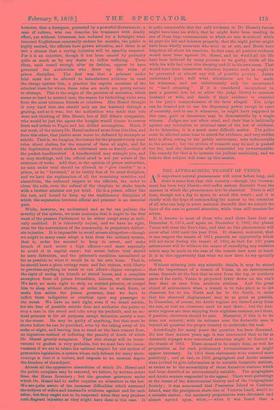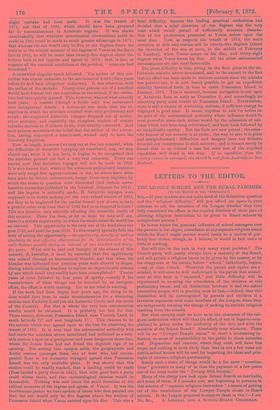THE APPROACHING TRANSIT OF VENUS.
AN important natural phenomenon will occur before long, and there is some fear that this country—though the Govern- ment has been very liberal—will suffer serious discredit from the manner in which the phenomenon is to be observed. There is still time, though not a day to spare, to avoid this result; and it is chiefly with the hope of commending the matter to the attention of all who can help to avert national discredit that we submit the facts of the case to general attention, while time still remains for action.
It is known to most of those who read these lines that on December 8, 1874, and again on December 6, 1882, the planet Venus will cross the Sun's face, and that no like phenomenon will occur after 1882 until the year 2004. It chances, moreover, that in one respect the transit of 1874 presents an opportunity which will not recur during the transit of 1882, so that for 130 years astronomers will be without the means of remedying any omission which may be made in the case of the transit now near at hand. It is to this opportunity that what we now have to say specially relates.
Without entering into any scientific details, it may be stated that the importance of a transit of Venus, in an astronomical sense, depends on the fact that as seen from the top or northern parts of the earth, Venus is projected lower down on the sun's face than as seen from southern stations. And the great object of astronomers when a transit is to take place is to set observers far to the North and far to the South, in order that the observed displacement may be as great as possible. In December, of course, the Arctic regions are turned away from the sun, so that no observers need be sent there ; but the Ant- arctic regions are then enjoying their nightleas summer, and there, if possible, observers should be sent. Moreover, if this is to be done, our country, with its colonies near the Antarctic seas, is beyond all question the proper country to undertake the task.
Accordingly for many years the question has been discussed. No leas than sixteen years ago it was announced that so far as Antarctic voyages were concerned attention might be limited to the transit of 1882. There seemed to be ample time, as well for preparation as for such preliminary reconnaissances as might appear necessary. In 1864 these statements were renewed more positively ; -and at last, in 1868, geographers and Arctic seamen were invited to give information as to suitable Antarctic stations, or rather as to the accessibility of those Antarctic stations which had been described as astronomically suitable. The geographers and Arctic seamen responded to the appeal. There were gatherings at the rooms of the Astronomical Society and of the Geographical Society ; it was announced that Possession Island or Coalman bland, near the precipitous shore-line of Victoria Land, would be a suitable station ; the necessary preparations were discussed and almost agreed upon, when, — when it was found that a
slight mistake had been made. It was the transit of 1874, not that of 1882, which should have been prepared for by reconnaissances in Antarctic regions. It was shown unmistakably that whatever astronomical observations could be made in 1882 could be made to much greater advantage in 1874; that whereas the sun would only be five or six degrees above the horizon at the critical moment of the ingress of Venus on the Sun's face in 1882, he will be more than twenty-five degrees above the horizon both at her ingress and egress in 1874; that, in fine, as respects all the essential conditions of the problem, "some one had blundered."
A somewhat singular result followed. The author of this cor- rection was almost unknown to the astronomical world (three years before he had been altogether unknown). It was otherwise with the author of the mistake. Ninety-nine persons out of a hundred would have formed but one conclusion on the subject, if the correc- tion had been quietly ignored. This, however, was not what actually took place. A contest (though a feeble one) was maintained over unimportant details ; a statement was made that the re- searches in which the mistakes occurred were only preliminary and rough ; the suggested Antarctic voyages dropped out of notice ; other mistakes, and especially the complete neglect of certain valuable stations in Northern India, were silently corrected. And most persons entertained the belief that the author of the correc- tion, having discovered a mare's-nest, wished only to have the discovery forgotten.
Now, at length, however (we may say at the last moment, when the difficulties of Antarctic voyaging are considered, nay, we may almost say, when it is too late), it begins to be recognised that the mistakes pointed out had a very real existence. Every one knows now that Antarctic voyages will not be made in 1882. It is also known that, whether the erroneous preliminary inquiries were only rough first approximations or not, no others have since been made by British astronomers, except those very inquiries by which the errors in question were discovered (and certain corro- borative researches published in the Nautical Almanac for 1874) ; and the inquiry is naturally made, If Antarctic voyages were supposed to be worth making for the over-valued transit of 1882, are they to be neglected for the earlier transit now shown to have a greater value even than that of 1882 had been supposed to have ? This is a question very seriously affecting the scientific credit of this country. There has been, or let us hope we may still say, there is a certain opportunity, in which the whole scientific world has an interest. This opportunity is the only one of the kind since the year 1769, and until the year 2004. To this country specially falls the duty of seizing the opportunity,—the opportunity. ?lamely, of making absolutely the most effective observations for the determination of the sun's distance possible during an interval of two hundred and thirty- five years. What will be said and thought of the science of this country, if, hereafter, it must be recorded that the opportunity was missed through an astronomical blunder, and that when the blunder was indicated four precious years were allowed to elapse, during which nothing was done to replace an impracticable scheme by one which could very readily have been accomplished ? Twelve years of error followed by four years of apathy,—surely if the remembrance of these things can be removed by an energetic effort, the effort is worth making. Let us see what is wanting.
If the work had been began four years ago, the thing to be done would have been to make reconnaissances for a wintering station near Enderby Land (on the Antarctic Circle, and due south of the Crozets). For that is where the very best astronomical results would be obtained. It is probably too late for this. There remain, however, Possession Island, near Victoria Land, in south latitude 72° and east longitude 71°. This chances to be the station which was agreed upon as the best for observing the transit of 1882. It is true that the astronomical authority who had made the mistakes above mentioned had indicated as a suit- able station a spot on a precipitous and most dangerous shore-line, where Sir James Ross had not found the slightest sign of an opening. But setting that opinion aside, the geographers and Arctic seamen (amongst them one at least who had accom- panied Ross in his Antarctic voyages) agreed that Possession Island was the only available place. It was shown that this station could be readily reached, that a landing could be made (Rose landed a party there in 1842), that with good huts a party could winter there, and that meteorological chances would be favourable. Nothing was said about the sun's elevation at the critical moments of the ingress and egress of Venus. It was the troublesome person we have spoken of above who first pointed out that the sun would only be five degrees above the horizon of Possession Island when Venus entered upon his disc. This was a fatal difficulty, because the leading practical authorities had decided that a solar elevation of ten degrees was the very least which would permit of sufficiently accurate observa- tion of the phenomena presented as Venus enters upon the solar disc. Now, as respects the transit of 1874, the sun's elevation at this very station will be twenty-five degrees (about the elevation of the sun at noon, in the middle of February in London), when Venus enters on his disc, and thirty-eight degrees when Venus leaves his disc. All the other astronomical circumstances are also most favourable The great difficulty is that, owing in the first place to the un- fortunate mistake above-mentioned, and in the second to the fact that no effort has been made to retrieve matters since the mistake was pointed out, it is now barely possible to get an expedition suitably furnished forth in time to reach Possession Island in January, 1874. This is essential, because navigation is not open in Antarctic Seas so early as December 8, and accordingly an observing party must winter in Possession Island. Nevertheless, there is still a chance of retrieving matters, if sufficient energy be displayed in good time. It seems hopeless to look for action on the part of the astronomical authority whose influence would be most powerful, since such action would be the admission of mis- takes which had been long entertained, and have been followed by an inexplicable apathy. But the facts are now patent ; the scien- tific honour of our country is at stake ; the way to save it is plain and straightforward : difficulties and dangers have not hitherto deterred our countrymen in such matters ; and it cannot surely be feared that in so critical a case the mere cost of the required expedition will stand in the way. If an expedition from this country cannot be managed, one should be sent from Australia or New Zealand.



































 Previous page
Previous page